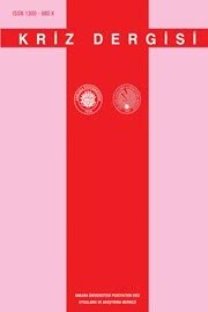DEPREMZEDE RUHSAL DANIŞMA MERKEZİNE BAŞVURANLARIN SOSYODEMOGRAFİK ÖZELLİKLERİ VE SEMPTOM SIKLIKLARI
Amaç: Deprem sonrası psikiyatrik başvurularda kayıpların, akut stres bozukluğu belirtilerinin sıklığının saptanması amaçlanmıştır. Yöntem: Ruhsal danışma merkezine başvuran depremzedelerin sosyodemografik özellikleri, deprem sırasındaki kayıpları, sosyal desteklerini sorgular yarı yapılandırılmış görüşme formu ile, akut stres bozukluğu semptomlarından oluşturulmuş yarı yapılandırılmış bir semptom listesi uygulanmıştır, ilk başvuru olan 177 olgu değerlendirmeye alınmıştır. Bulgular: 177 başvurunun %64.3'ünü (n=114) kadınlar oluşturmuştur. Başvuru sırasında depremden sonra geçen süre 11.15±5.67 gündür. Başvuranların %29.6'sı deprem sırasında göçük altında kalmış, %58.8'i ise herhangi bir fiziksel yaralanması olmadığını bildirmiştir. Olgulardan %83.4'ü deprem sonrası yeterli sosyal desteğe ulaşabildiklerini bildirmişlerdi. En sık ve en şiddetli semptomlar depremi tekrar tekrar hatırlama, depremi hatırlatan durumlarda sıkıntı duyma ve uyku bozukluğudur. Sonuç: Deprem sonrası psikiyatrik başvuruların kadınlarda daha sık olduğu, ilk ay içerisinde intrusiv semptomların daha ön planda geldiği düşünülmüştür.
Anahtar Kelimeler:
Felaket, deprem, akut stres, ruhsal belirti
Sociodemographic Features and Symptom Frequencies of Admission to Psychiatric Consulting unit for Earthquake Sufferers
Objective: İt was aimed to determinate the frequencies of losses and symptoms of acute stress disorder after an earthquake in population of psychiatric admission. Method: Sociodemographic features, the losses have been arised during the earthquake, social support of sufferers who admit to psychiatric consulting unit were evaluated with a semi-structured interview form. The frequencies of symptoms of acute stress disorder were evaluated with an other semi-structured intervievv form that adapted from CAPS (Clinician-administrated PTSD scale). 177 subjects were assessed. Results: 64,3% (n=114) of 177 subjects were constituted female objects. The past period from earthquake to admission were 11.15±5.67 days. 29.6% of subjects have had in trouble under the collapsed building, and 41.2% of subjects have injured. 83.4% of subjects reported that they have efficient social support after the disaster. The most frequent and the most severe symptoms are to remember the earthquake frequently, to suffer annoyance in situations about the earthquake and sleep disturbances. Conclusion: We consider that psychiatric admissions are more frequent in female subjects after an earthquake, and intrusive symptoms are first in importance during the first month following earthquake.
Keywords:
Disaster, earthquake, acute stress, psychiatric symptom,
- ISSN: 1300-980X
- Başlangıç: 1992
- Yayıncı: Ankara Üniversitesi
Sayıdaki Diğer Makaleler
THE EPİDEMIOLOGY OF SUICIDE ATTEMPTS İN EUROPE
ANNE VE BABA GÖZÜYLE "ÇOCUK EĞİTİMİ" BİR SOSYAL TEMSİL ÖN ÇALIŞMASI
PSİKİYATRİ POLİKLİNİĞİNE BAŞVURAN HASTALARDA NİKOTİN BAĞIMLILIĞI
Murat KULOĞLU, Murad ATMACA, Aytaç POLAT S., Ahmet ÜNAL, Ertan TEZCAN A.
DEPREMZEDE RUHSAL DANIŞMA MERKEZİNE BAŞVURANLARIN SOSYODEMOGRAFİK ÖZELLİKLERİ VE SEMPTOM SIKLIKLARI
Nahit Kamil ÖZMENLER, Tunay KARLIDERE, Salih BATTAL
HABER / 36. ULUSAL PSİKİYATRİ KONGRESİ ANTALYA/ BELEKTE GERÇEKLEŞTİRİLDİ
DEPREMZEDE AİLELERE YÖNELİK KORUYUCU MÜDAHALE ÇALIŞMASI
İşık SAYIL, Saynur CANAT, Recep AKDUR, Öztürk KILIÇ EMİNE, Rana USLU
ANNE VE BABA GÖZÜYLE "ÇOCUK EĞİTİMİ" BİR SOSYAL TEMSİL ÖN ÇALIŞMASI
